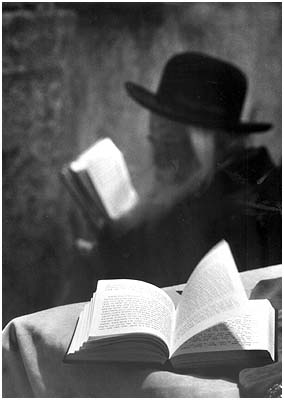A Three-Part Strategy For Successful Davening During The Yomim Noraim
Despite the complaints of other people in shul that the Rosh Hashana davening was too long this year, I felt as if the davening went by extremely quickly. I think I have finally discovered a successful three-part strategy that allowed me to get the most out of davening for Rosh Hashana.
1. Seat choice: While you may not be able to dictate the seat assignments for all of the people surrounding you, sitting next to other people who are focused and do not talk to their neighbors is extremely important. Unless you already have a set seat, find a seat next to someone you don't know, or rarely speak to, so you will not be tempted to talk during the service. The people who sit around you may help lift you up during davening or prevent you from putting your all into it. This year my seat assignment was next to the same quiet older man that I sat next to last Rosh Hashana. Although we wish each other "Shana tova" before and after davening, we do not speak at all during the service. He is the perfect neighbor and I wish he had twin brothers with similar temperaments who could sit in all the chairs around me.
2. Focus only on the Machzor: I discovered that the single most important technique for me was not to look up from my machzor unless I really had to. This prevented me from getting distracted or looking at a person who annoyed me with less than a "good eye". At times when I felt that I was losing interest in the service, I would ask Hashem in my own words to help me to concrete and remember the great importance of Rosh Hashana. In this way, I interspersed the entire Rosh Hashana davening with hisbodedus; making it all the more meaningful to me.
3. Closing one's eyes: At times such as the blowing of the shofar and the repetition of the Amida, I closed my eyes to allow the sounds to resonate deeper. Hearing the sound of the shofar blown with my eyes closed was a completely different experience than hearing it with my eyes open. The awe-inspiring words of U'nesaneh Tokef even increased in their intensity. Blocking out the sight of people impatiently fidgeting during the chazzan's repetition of the Amida made it easier for me to remain focused and to allow the words to enter my heart.
This three-part strategy helped me immensely during Rosh Hashana and I plan to follow this strategy again for Yom Kippur.










7 Comments:
Great strategies, ASJ. May I suggest another one for those of us who for whatever reason can't apply your strategies (some people are friendly with just everyone, can't take long davening no matter what they do, or whatever).
Choose the shul you're gonna daven at for Yomim noraim! If you can't be in shul from 8 till 2, daven with a sefardi minyan! (They usually daven vasikin, and say much less piyutim, so you can really concentrate on what's important in davening. And this way there's also less talking.) I'm Ashkenazi, and I asked my rosh yeshiva a few years ago if that's OK, and he said yes. And, davening vasikin on yamim noraim can only help.
This post, together with the quote from Rebbe Nachman, are very inspiring words for these days! May we all learn from them & take them with us into Yom Kippur!
BTW, would it be possible to provide more precise details of the R. Nachman quote - which sefer, which Torah or page, etc?
thanks.
Anonymous: I always appreciate feedback on my posting and thank you for taking the time to leave a comment.
Yitz: The quote from Rebbe Nachman of Breslov comes from Likutey Eitzos (Tefillah #92)
I like your strategies but if you are not successfull with # 1 you davening as as good as nothing. Every year I try to get away from the type of people you don't wan't to be around but unfortunately there are too many of them to escape. Check out my post on one of the issues that occured to me this Rosh Hashana. On Yom Kippur I am davening someplace else and I already spoke to the Rav about my seat and what I should do since I know I might have a problem from where I am sitting.
Frum With Questions: As a skinny person, I can certainly sympathize with what you went through in your posting.
Great ideas . . .
If I may, might I add:
The Alter Rebbe's three (for the whole year)
-Learning Chassidus
-Mikvah
-Tzedaka before davening (In this case, erev Yom Tov)
as well as:
-Davening with a nigun -i.e. to have a nigun to sing during times of meditation, before tekios etc.
-making sure that we know the pirush hamilos (Even for those of us that don't need the help during the year, with all the piyutim etc.)
ASJ, often seating for the Yomim Noraim is by lottery at many shuls, which sucks, as you have no control over your environment. I also always close my eyes when I hear the shofar - the sound enters into both my body and my soul that way for some reason. I always try to have a niggun going while davening, but love the idea of interspersing the davening with hitbodedut when my mind starts to drift. Great idea! Thanks...
Post a Comment
<< Home